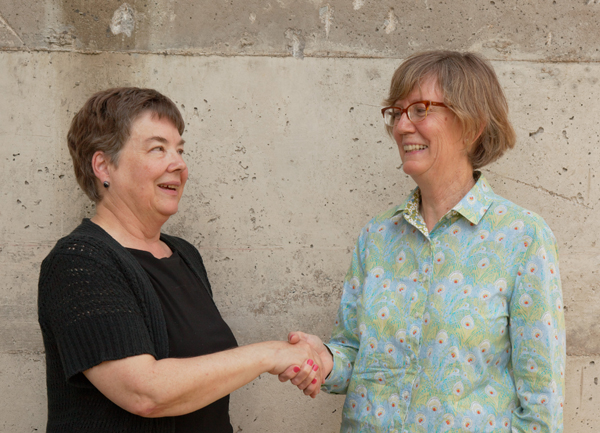Nancy Reid, University of Toronto, is the Director of the Canadian Statistical Sciences Institute. She writes:
The Canadian Statistical Sciences Institute, CANSSI (Institut canadien des sciences statistiques, INCASS), www.canssi.ca, was established in 2012 by the Statistical Society of Canada. Professor Mary Thompson of the University of Waterloo served as Scientific Director until June 2015, successfully obtaining funding from the Natural Sciences and Engineering Research Council for the period 2014–19. I followed her as Director in June 2015, and John Braun, University of British Columbia, became the inaugural Deputy Director in July 2015.

Former CANSSI Director Mary Thompson (left) with current Director Nancy Reid
The purpose of CANSSI is to advance research in the statistical sciences in Canada by attracting new researchers to the field, increasing the points of contact among researchers nationally and internationally, and developing scientific collaborations with other disciplines and organizations.
CANSSI is a virtual institute, building research capacity across the country, and relying on Canada’s three mathematical sciences institutes for infrastructure and logistical support: the Fields Institute for Research in the Mathematical Sciences, the Pacific Institute for the Mathematical Sciences (PIMS), and the Centre de recherches mathématiques (CRM). Institutional members—Departments of Mathematics and of Statistics across the country—generously provide additional funding that is used to support the operations of CANSSI.
Scientific Activities
The overriding scientific goals of CANSSI are to develop encourage scientific innovation through collaborations between statistical scientists and researchers in other disciplines, to foster research excellence by increasing international points of contact, and to help train the next generation of statistical scientists. We do this through three main programs: Collaborative Research Teams, Workshops and Conferences, and Postdoctoral Fellowships.
The currently funded Collaborative Research Team projects are:
• Advancements to State-Space Models for Fisheries Science
• Copula Dependence Modeling: Theory and Applications
• Statistical Modeling of the World: Computer and Physical Models in Earth, Ocean and Atmospheric Sciences
• Evolved Marked Point Processes with Applications to Wildland Fire Regimes
• Statistical Inference for Complex Surveys with Missing Observations
• Modern Spectrum Methods in Time Series Analysis: Applications in Physical Science, Environmental Science and Computer Modeling.
CANSSI also funds two CANSSI post-doctoral fellowships, joint initiatives with SAMSI, and provides partial funding for several workshops each year. Most recently, CANSSI supported the International Symposium in Statistics (ISS 2015), a workshop on Advancing Innovation and Scholarship in Statistics Education at Western University, the Canadian Human and Statistical Genetics Meeting, and a conference on Statistical and Computational Analytics for Big Data. This last meeting was the closing conference of a six-month thematic program on Statistical Inference, Learning and Models for Big Data: CANSSI leverages its funding by promoting thematic programs at the mathematical sciences institutes.
Governance and Management
CANSSI has a Board of Directors, chaired by Richard Smith of the University of North Carolina, and an international Scientific Advisory Committee. The membership of CANSSI consists of institutional members, which are universities supporting CANSSI through a financial contribution. CANSSI holds an annual general meeting in June, and the Board of Directors meets in June and December.
CANSSI is managed by the Director, Deputy Director, the Scientific Coordinator, the Financial Coordinator and a team of five regional Associate Directors.
International Ties
Scientifically, the future for statistical sciences seems very bright: undergraduate enrollments are skyrocketing, and the topics of Data Science and Big Data seem to have alerted both students and researchers to the many opportunities for statistical sciences to grow beyond its traditional borders. This involves developing new training models for students, forging new collaborations, especially with computer science, and positioning statistical scientists in leadership roles in these efforts. At the same time it is very important to continue emphasizing the relevance of traditional aspects of statistical science in the big data world.
These challenges are of course global challenges, and being faced by departments, schools, universities, institutes, centres and research grants agencies around the world. CANSSI will be working hard in the coming months to build and strengthen international ties, through formal and informal agreements, student exchanges, reciprocal advertising, and so on.
Please don’t hesitate to contact me directly, reid@utstat.utoronto.ca, for further information about CANSSI, or to discuss how we might collaborate with your unit.
Comments on “Canadian Statistical Sciences Institute”